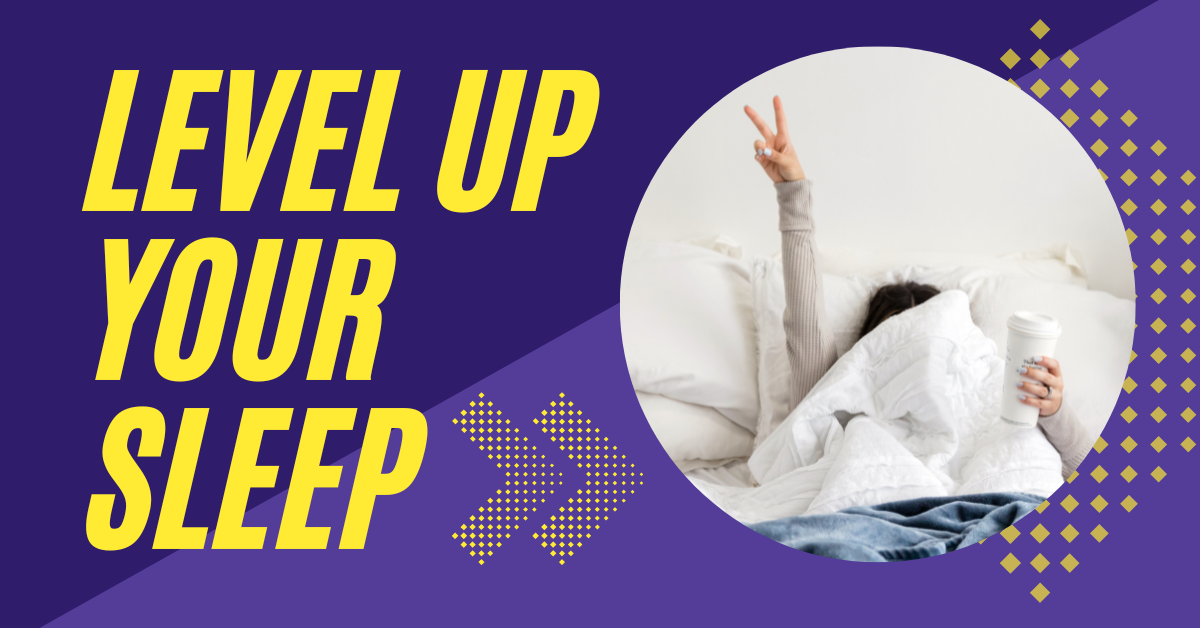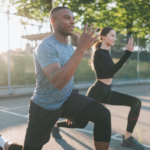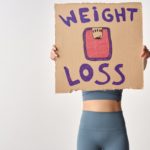Ways On How To Lose Weight Without Exercise

Introduction
Have you been searching for the best ways on how to lose weight without exercise? Losing weight may be a stressful and overwhelming task, especially when it appears that every weight loss program available entails long hours at the gym or strenuous training regimens. However, there are other strategies to lose weight that do not entail exercise. In this essay, we’ll look at some tried-and-true weight-loss methods that don’t require you to break a sweat.
Whether you despise the gym, have a hectic schedule, or simply lack motivation to exercise, these suggestions will help you achieve your weight loss objectives without the added stress or strain of standard exercise methods. So, if you’re ready to ditch the treadmill in favor of a healthier lifestyle, keep reading!
In this piece, we’ll go over the following tried-and-true methods for losing weight without exercise:
- Making healthier eating choices and reducing portion sizes
- Staying hydrated and drinking plenty of water
- Getting enough sleep and dealing with stress
- Are you thinking about taking weight loss vitamins or medications?
By following these guidelines, you can easily reduce weight and improve your overall health without the time and effort required by typical workout methods. Continue reading to learn more about each of these methods and how you may implement them in your daily life.
Reduce Portion Sizes and Make Healthier Food Choices
Cutting calories through diet modifications is one of the most efficient ways on how to lose weight without exercise. When you eat less calories than your body requires, it begins to utilize stored fat as energy, resulting in weight loss.
There are a few key methods for reducing calories through dietary changes:
- Reduce portion sizes: Instead of overeating, try eating smaller, more often meals throughout the day. This can assist you in controlling your calorie intake and avoiding overeating.
- Make healthier food choices: Choose foods with less calories and more nutrients, such as fruits, vegetables, and lean proteins. These foods can help you feel full and satisfied without consuming an excessive number of calories.
- Limit or eliminate sugary drinks and snacks: Sugary drinks and snacks are frequently heavy in calories while providing little nutritional value. You can dramatically reduce your calorie consumption by eliminating or restricting these from your diet.
- Plan your meals and snacks: Meal planning can assist you in sticking to your diet and making healthier food choices. Consider prepping your meals ahead of time or bringing nutritious snacks with you on the road.
You can efficiently cut calories and lose weight without exercising by making these dietary changes. Remember that everyone’s calorie demands differ, so check with a healthcare expert or qualified dietitian to determine the best calorie intake for you.
Examples of healthy, low-calorie meals and snacks
It is important to focus on meals that are healthy. Here are some examples of healthy, low-calorie meals and snacks:
- Meals:
- Grilled chicken with roasted vegetables
- Baked salmon with quinoa and steamed broccoli
- Black bean and vegetable soup with a side of whole grain bread
- Veggie omelette with whole grain toast
- Turkey and avocado wrap with mixed greens
- Snacks:
- Apple slices with almond butter
- Baby carrots and hummus
- Greek yogurt with berries and nuts
- Hard-boiled eggs and cherry tomatoes
- Edamame with sea salt
Remember to eat nutrient-dense meals strong in fiber, protein, and other necessary nutrients while limiting or avoiding processed and high-calorie foods. Without the need for exercise, eating a variety of healthy, low-calorie meals and snacks can help you lose weight and improve your overall health.
Tip: Use a food diary or app to track intake and monitor progress
Tracking your food consumption can help you be attentive of your calorie intake and make healthier meal choices, which can be beneficial for weight loss. A food diary or app can also assist you in identifying patterns in your eating habits and making necessary dietary modifications.
To track your intake, keep a food journal or use an app:
- Choose a food diary or app that is convenient for you. There are numerous options, ranging from simple paper diaries to more complex apps that scan barcodes and track your nutrient intake.
- Everything you eat and drink, including quantity quantities and any sauces or seasonings, should be written down or entered. Be as specific as possible.
- Include the time of day, any physical activity, and any other circumstances that may have influenced your appetite or calorie requirements.
- Examine your journal or app on a regular basis to spot patterns and places for improvement. For example, you may discover that you eat more at specific times of day, or that when you have a plan in place, you make healthier choices.
You can stay on track with your weight loss objectives and make modifications as needed by recording your food consumption and tracking your success. Just remember to be patient and consistent, as losing weight is a process that can take time.
Drink Plenty Of Water and Stay Hydrated

How water can help with weight loss and overall health
Drinking enough of water can help you lose weight and improve your overall health. Here’s how it’s done:
- Water can help fill you up: Drinking a glass of water before a meal can make you feel fuller, causing you to eat less and consume less calories.
- Water can boost your metabolism: Drinking cold water can boost your metabolism because your body expends energy warming the water to body temperature.
- Water can flush out toxins: Drinking plenty of water will assist your body flush out toxins and waste, which can aid in weight loss and overall health.
- Water can help prevent dehydration: Dehydration can make you feel tired and affect your physical and mental functioning. Staying hydrated allows you to keep your energy levels up and your body running smoothly.
Drink at least 8-8 ounces of water every day to get the advantages of water, and more if you are physically active or live in a hot region. Other low-calorie, hydrating liquids, such as unsweetened tea or flavored water, can also be included in your diet. Simply restrict or avoid sugary beverages, which can contribute to weight gain.
Tips for increasing water intake, such as carrying a water bottle or setting reminders
Here are a few tips for increasing your water intake:
- Carry a water bottle with you: Keeping a water bottle on hand at all times can help you stay hydrated throughout the day. Look for a bottle that is easy to transport and has a convenient sipping straw or spout.
- Set reminders: Set reminders on your phone or computer if you frequently forget to drink water. You can also use a smart water bottle or an app that monitors your water consumption and gives you reminders to drink more.
- Drink water with meals: Make it a practice to drink a glass of water before each meal or snack. This can help you stay hydrated while also making you feel fuller, which can lead to healthier meal choices.
- Choose water-rich foods: Incorporate water-rich items, such as fruits and vegetables, into your diet to help hydrate your body and contribute to your daily water intake.
- Drink water when you’re thirsty: Listening to your body’s thirst cues may seem apparent, but it’s a crucial strategy to stay hydrated. Drink water frequently throughout the day rather than waiting until you’re dehydrated.
You may boost your water intake and support weight loss and overall health by adopting these strategies into your daily routine.
Get Enough Sleep and Manage Stress

The link between sleep, stress, and weight gain
Sleep, stress, and weight growth are all strongly linked. Here’s how they’re linked:
- Lack of sleep can lead to weight gain: When you don’t get enough sleep, your body may release more Ghrelin, a hormone that increases appetite and cravings for high-calorie, sweet foods. Sleep deprivation can also cause exhaustion and decreased physical activity, which can contribute to weight gain.
- Stress can lead to weight gain: Stress can cause the hormone cortisol to be released, which can lead to an increase in appetite and desires for unhealthy foods. Stress can also lead to bad habits like overeating or missing meals, which can lead to weight gain.
- Weight gain can lead to sleep and stress issues: Obesity and overweight can raise the risk of sleep disorders such sleep apnea, which can interrupt sleep and contribute to weariness and stress. Furthermore, the physical and emotional burden of being overweight or obese can be a source of stress in and of itself.
You may improve your overall health and well-being by prioritizing sleep, controlling stress, and keeping a healthy weight.
Strategies for improving sleep quality and reducing stress, such as relaxation techniques and setting a consistent sleep schedule
Here are some tips for enhancing sleep quality and lowering stress:
- Practice relaxation techniques: Deep breathing, meditation, or yoga, for example, can help calm the mind and relax the body, which can enhance sleep quality and reduce stress.
- Set a consistent sleep schedule: A consistent sleep schedule can assist in regulating your body’s natural sleep-wake cycle and improving sleep quality. Even on weekends, try to go to bed and wake up at the same time every day.
- Create a comfortable sleep environment: A relaxing and restful sleeping environment can help you relax and sleep soundly. This could include a comfy bed, a cool and dark room, and as little noise and distractions as possible.
- Exercise regularly: Physical activity on a regular basis might help reduce stress and enhance sleep quality. Just keep in mind that intense exercise should be avoided too close to bedtime, since it may interfere with sleep.
- Avoid caffeine, alcohol, and screens before bed: Caffeine, alcohol, and displays (such as phones, tablets, and televisions) can all interrupt sleep and raise stress levels. Avoid or minimize these substances and activities near bedtime.By adopting these tactics into your daily routine, you may improve your sleep quality and reduce stress, which can help you lose weight and improve your overall health.
Consider Weight Loss Supplements Or Medications
An overview of various supplements and medications that may aid in weight loss, such as natural herbs or prescription drugs
Natural herbs and prescription pharmaceuticals are among the supplements and treatments that may help with weight loss. It should be noted that these solutions should not be utilized in place of a balanced diet and lifestyle, and they may not work for everyone. Among the possible alternatives are:
- Natural herbs: Some herbs, such as green tea extract, Garcinia cambogia, and glucomannan, may aid in weight loss by suppressing hunger, improving metabolism, or preventing fat absorption. These plants are frequently accessible as supplements, although their usefulness and safety have not been adequately demonstrated.
- Prescription drugs: Weight loss medications such as orlistat, liraglutide, and phentermine are available via prescription. These medications function through various ways, such as blocking fat absorption or raising metabolism. Prescription weight reduction medications should only be taken under the guidance of a healthcare expert because they may have negative effects and are not appropriate for everyone.
Before taking any weight loss supplements or drugs, consult with a healthcare expert. They can assist you in determining the best method for you based on your specific needs and medical history.
Warning about the potential risks and side effects of these options, and the importance of consulting with a healthcare professional before use
Before utilizing any of these choices, it’s critical to be aware of the potential hazards and side effects of weight reduction supplements and drugs, and to contact with a healthcare expert. Here are a few things to think about:
- Natural herbs: While certain natural herbs may have some weight loss potential, their efficiency and safety have not been well studied. These herbs may interact with pharmaceuticals or create unpleasant side effects such as digestive difficulties or allergic responses in some situations.
- Prescription drugs: Prescription weight loss medications might have negative side effects and are not appropriate for everyone. These medications’ most common side effects are gastrointestinal difficulties, dizziness, and an irregular heart rate. It is critical to consult with a healthcare expert about the potential risks and advantages of these medications, as well as to follow the directions for usage.
- Overall risks: Weight loss supplements and pharmaceuticals are not a miraculous cure for obesity, and they should not be used as a substitute for a healthy diet and lifestyle. Rapid weight reduction can also have detrimental health effects, such as vitamin shortages and gallstone formation.
Before utilizing any weight loss vitamins or drugs, it is critical to contact with a healthcare expert. They can advise you on any potential dangers or side effects and help you select the best method for you based on your unique needs and medical history.
Ways On How To Lose Weight Without Exercise Conclusion
Here is a summary of the post’s main points:
- It is possible to lose weight without exercising by making dietary adjustments such as reducing portion sizes, eating healthier foods, and eliminating sugary drinks and snacks.
- Staying hydrated and drinking plenty of water can help with weight loss and overall health.
- Getting proper sleep and dealing with stress can also help with weight loss and overall health.
- Weight loss supplements and pharmaceuticals may be an option for some people, but it is critical to contact with a healthcare practitioner before utilizing any of these choices because they may have risks and adverse effects.
- A good diet and lifestyle, as well as regular physical activity and stress management, are critical for long-term weight loss and general health.
Now that you’ve heard about some effective weight loss tactics that don’t require exercise, it’s time to put them into action! You can control your weight and enhance your general health by incorporating these recommendations into your everyday practice. Here are some ideas to get you started:
- Choose one or two tactics to focus on and determine how to incorporate them into your everyday routine. For example, you may start bringing a water bottle with you or prepare your meals and snacks ahead of time.
- Keep track of your progress. Track your food consumption with a food diary or an app, or keep a journal to track your sleep, stress, and other things that may affect your weight. Seeing your progress can be a terrific motivator and keep you on target.
- Try not to be too hard on yourself. Weight loss is a journey, and there will be ups and downs. Remember to be patient and persistent, and to recognize your victories and development along the way.
You may get control of your weight and improve your general health by implementing these tactics and documenting your progress. Remember that everyone’s journey is unique, so figure out what works best for you and your body. You may achieve your weight loss objectives and live a better, healthier life with focus and determination.
Now that you’ve heard about some ways on how to lose weight without exercise, it’s time to take action and begin incorporating these recommendations into your daily routine. We’d love to hear from you and learn about your weight reduction experience.
If you have any suggestions or strategies for losing weight without exercise, please share them in the comments section below. Alternatively, if you have any opinions on this topic or the tactics we’ve mentioned, we’d love to hear from you.
You may help those who are dealing with weight loss and provide support and encouragement on their journey by sharing your experiences and ideas. So don’t be shy; leave a comment and tell us what you think!



